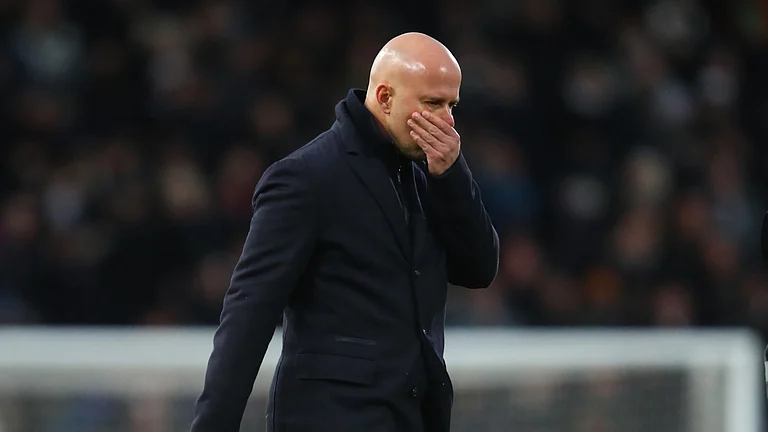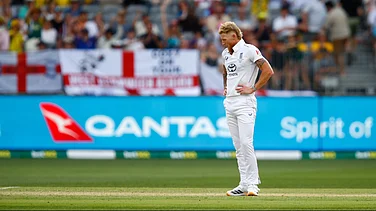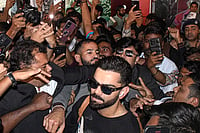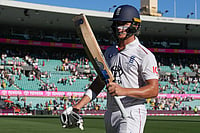“Bonzer little fellow”. Does the phrase ring a bell?
In those three words filled with affection and colloquial flavour, Sir Don Bradman described Sachin Tendulkar to his son John Bradsen, after hosting Tendulkar and Shane Warne at his Neo-Georgian home in Adelaide’s quiet Kensington Park area.
That was in 1998. Three years later, Bradman passed away. But had he been alive, and watched Virat Kohli’s never-say-die 82 not out against Pakistan in the ICC T20 World Cup 2022, he might very well have said, “What a bonzer little innings.”
There is something about Australia, as opponents or as a stage, that results in riveting cricket. Some of India’s greatest performances have occurred in Australia, or against them.
It was against Australia that the finest Indian Test innings of all time was played – VVS Laxman’s 10-hour 281, while following on, in Kolkata heat in 2001. Rahul Dravid supported him with a heroic 180. The two put on 376 runs as India registered a famous win.
Australian cricket evokes contrasting feelings. They can be hostile, but when the opponent does well, they appreciate, for the most part.
Some players can accept this, some can’t. Laxman is among those who has had no problems with the Aussie approach. Of course, it’s easier to be gracious towards a team against whom you have succeeded. Six of Laxman’s 17 Test hundreds came against Australia. Four of them were on Australian grounds.
“Right from 1994, when I played for India under-19s against Australia under-19s, one thing I found was that they were the most sporting opposition I came across,” Laxman said after India won the 2000-2001 series. “They used to play the game really hard on the field, but they would be the first to congratulate an opposition if they did well.”
During Laxman’s miracle at Eden Gardens, Australian wicket-keeper, Adam Gilchrist, was complimenting him. “It was almost that he was appreciating my efforts without compromising on the aggression or wanting me to get out as a keeper,” he said.
At the end of the series, Australian captain Steve Waugh gifted Laxman a ball that had been used in the contest, saying, “You screwed up our series.”
Among other iconic knocks by Indians in or against Australia have been Tendulkar’s 114, at age 19, on an explosive Perth track; his two consecutive Sharjah ‘Desert Storm’ hundreds; a T20-style 195 by Virender Sehwag at the Melbourne Cricket Ground (MCG) and a match-winning 233 and 72 not out by Dravid in Adelaide.
India as a team too have enjoyed some of their most glorious moments in Australia. In 1985, they won the World Championship of Cricket there. A nation learnt what ‘Audi’ was, as Ravi Shastri won a champagne gold sedan from the German automaker after emerging as the tournament’s ‘Champion of Champions’. After World Cup 1983, it was the country’s most significant victory of that time. It established India as the best One-day team in the world and set things up nicely for future generations, not to mention the game’s economic future.
More recently, the Rishabh Pant-inspired victory in the Test series over Australia in 2020-21 showed that India had well and truly overcome the intimidation factor of playing in SENA (South Africa, England, New Zealand and Australia) nations. It was a win achieved after being bowled out for 36 in the first Test in Adelaide. It was a win achieved without Kohli, who had flown back to India to be with his wife for the birth of their daughter.
When Waugh told Laxman, “You screwed up our series”, he was being complimentary. But such has been the turbulence in this cricketing marriage between the two nations that there was a risk of divorce on a couple of occasions. Major controversies erupted and almost became diplomatic crises.
In 1981, Sunil Gavaskar, incensed after being abused by Australian players after a contentious leg before decision, stormed off the Melbourne pitch, taking partner Chetan Chauhan along. The team manager, Wing Commander Shahid Ali Khan Durrani, had to hasten out of the pavilion, and onto the pitch, to send Chauhan back to the crease.
"By the time I reached the outfield, both Gavaskar and Chauhan were just about a few metres from the boundary. This is when I ordered Chauhan back to the crease and sent (next man, Dilip) Vengsarkar in. Fortunately for India, an ugly situation was averted which could have caused India and the BCCI a great deal of embarrassment." Durrani once recalled to Times of India. "In the dressing room, I talked to Gavaskar and prevailed upon him to forget the incident and to get on with the game. He realised his mistake and the game proceeded without any more untoward incidents.”
Similarly, the ‘Monkeygate’ controversy of 2007-08, when Andrew Symonds accused Harbhajan Singh of using a racist slur against him, almost brought the series to a premature and acrimonious end.
Sense and cricket won in those episodes. And now, Kohli has given us more reason to celebrate India’s electric, tempestuous bond with Australia.


























